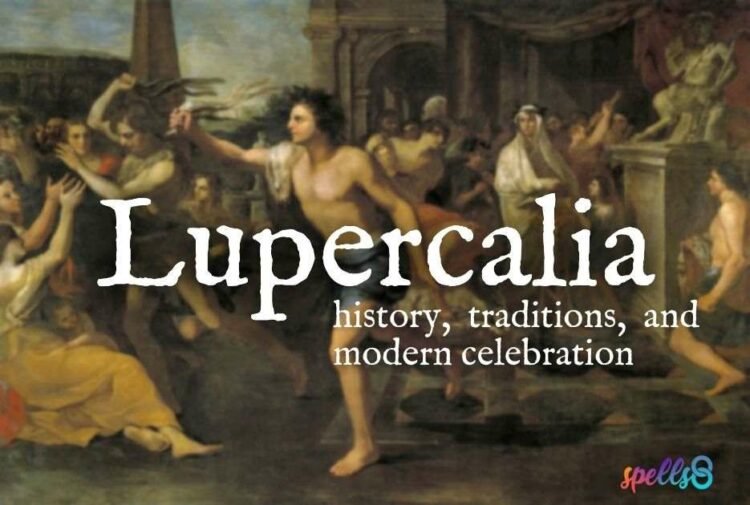Lupercalia is an ancient Roman festival that was celebrated every year on February 15th. It was a fertility festival dedicated to Lupercus, the Roman god of shepherds and fertility, as well as to the founders of Rome, Romulus, and Remus. Though not many people celebrate Lupercalia today, those with pagan practices or connections may want to add this celebration to their Wheel of the Year.
Keep reading to learn about the history of Lupercalia, ancient practices, and how you can adapt this holiday for celebration in a modern world!

History of Lupercalia
No one quite knows the exact origins of Lupercalia. It is thought to predate the founding of Rome itself, but this is speculation based on what little surviving records we have available. Some scholars believe that Lupercalia was influenced by older Greek fertility celebrations! In fact, it is thought that Lupercalia was originally called Februa or Februatus. It was also connected with the Roman goddess Juno and her role as a patron deity of the month of the festival. In Rome, Lupercalia was such a significant festival that it was celebrated for centuries, even after the rise of Christianity!
Lupercus
Not much is known about this obscure Roman deity. It is said that he is a protector of farmers, shepherds, harvesting, and wild animals. He is also connected with fertility and pregnancy due to his role in caring for Romulus and Remus. It is said that Lupercus helped the she-wolf Lupa care for the abandoned children until they eventually found a home with a shepherd named Faustulus. In Greek mythology, Lupercus is often compared with Pan.

The Luperci and Lupercalia
The priests that devoted themselves to Lupercus were known as Luperci, or “brothers of the wolf”. During Lupercalia, these priests, or Luperci, gathered at the Lupercal. This is a sacred cave on the Palatine Hill believed to be the place where Romulus and Remus were nursed by Lupa. According to scholars, Lupercalia began with a sacrificial offering of a goat (or goats) and a dog. These were made at the Lupercal altar by one or two Luperci under the supervision of the chief priest of Jupiter. After the sacrifice, two Luperci would approach the altar to be anointed with blood from the sacrificial knife. They would then be wiped clean with wool that was soaked in milk and expected to laugh.
Once the sacrifice had been made, then they would feast. Once the feast was over, the fun and games began! The Luperci cut pieces of goat skin into strips called februa. They would then run naked (or almost naked) through the streets of the city in an anticlockwise direction. Then they would take the februa and attempt to hit people with it. Many women would intentionally get in the way to be hit with the februa because it was believed it would bring them fertility and luck in childbearing.
…many of the noble youths and of the magistrates run up and down through the city naked, for sport and laughter striking those they meet with shaggy thongs. And many women of rank also purposely get in their way, and like children at school present their hands to be struck, believing that the pregnant will thus be helped in delivery, and the barren to pregnancy.
Plutarch’s description of Lupercalia – Plutarch: Life of Caesar

Besides being associated with fertility and farmers, Lupercalia is also associated with purification and warding off evil. This is because the word “februa” means “purifications” or “purgings”, and “februa” gives its name to the month of February when Lupercalia takes place.
Though Lupercalia was celebrated for many years after the rise of Christianity, Pope Gelasius I (494 – 496) claimed that only the “vile rabble” continued to celebrate the festival. Instead, he wanted to forcefully abolish Lupercalia altogether. However, we know that the Roman Senate chose otherwise, claiming that Lupercalia was an essential part of Rome’s culture.
Lupercalia Today
Though many people would not run naked through the streets hitting others, and we highly discourage that, there are several ways you can celebrate Lupercalia today. Remember that Lupercalia is a fertility and purification festival. It was a time of joy, fun, and laughter! Those are three things we can draw inspiration from to celebrate Lupercalia as a modern Pagan.
Education
Honor the spirit of Lupercalia by learning what you can about the festival! Educate yourself about the history, traditions, and symbolism of Lupercalia. You can take this further by learning about ancient Roman culture and mythology associated with fertility and purification.

Create Lupercalia Rituals
Lupercalia is about fertility, harvest, and purification. Incorporate the symbolism of the wolf and the goat into your purification rituals. You may want to perform a home-cleansing spell, meditate on growth, or perform a fertility spell. Remember that fertility is not always about procreation! Harvests, gardening, and creativity can all be part of fertility rituals.
Explore Nature
There is a connection to nature and cycles with Lupercalia. Spend time outside in nature. Take a sketchbook or a camera and really take in the world around you. Meditate on the cycles of the natural world and how that reflects back in your own life.
Celebrate Fertility and Love
Lupercalia had strong associations with fertility and romance. If you’re interested, you could celebrate the love and affection in your life. This could involve spending time with loved ones, expressing gratitude for your relationships, or engaging in acts of kindness and generosity. You may even consider casting a spell to call love into your life!

Enjoy the Season
No matter how you choose to celebrate Lupercalia, remember that this ancient festival can be adapted to your personal life. Fertility, purification, and protection all mean different things to different people. Choose one or two activities you enjoy, and then spend time doing those activities on your own or with the people you love!
Love Reading: Valentine’s Tarot Spread for New Relationships
Who knew exes could come in handy? With this three-part tarot spread, key themes and lessons learned from past relationships and your own inner guiding light help to reveal your future love. Tarot readers either new or experienced can use this step-by-step spread to gain insights into a future of love.
Newborn Blessing Spell: Wiccan Child Blessing Prayer
An inspiring chant to bless a pregnancy. Invite Mother Nature’s and Father Sky’s protection with this pagan baby blessing. You can chant this spell upon an amulet (e.g. a charm bag with rosemary, sage, salt) and give it to the family or place it near the baby’s crib.
Lavender Tea Meditation: Purify & Sleep
Drink a cup of Lavender Tea and harness the calming effects of its soothing aroma. This herbal potion can bring total relaxation of the mind and body, neutralizing any bad moods. Lavender helps reduce stress levels and sleep disorders, granting an undisturbed night of sleep and a refreshed feeling in the morning.









